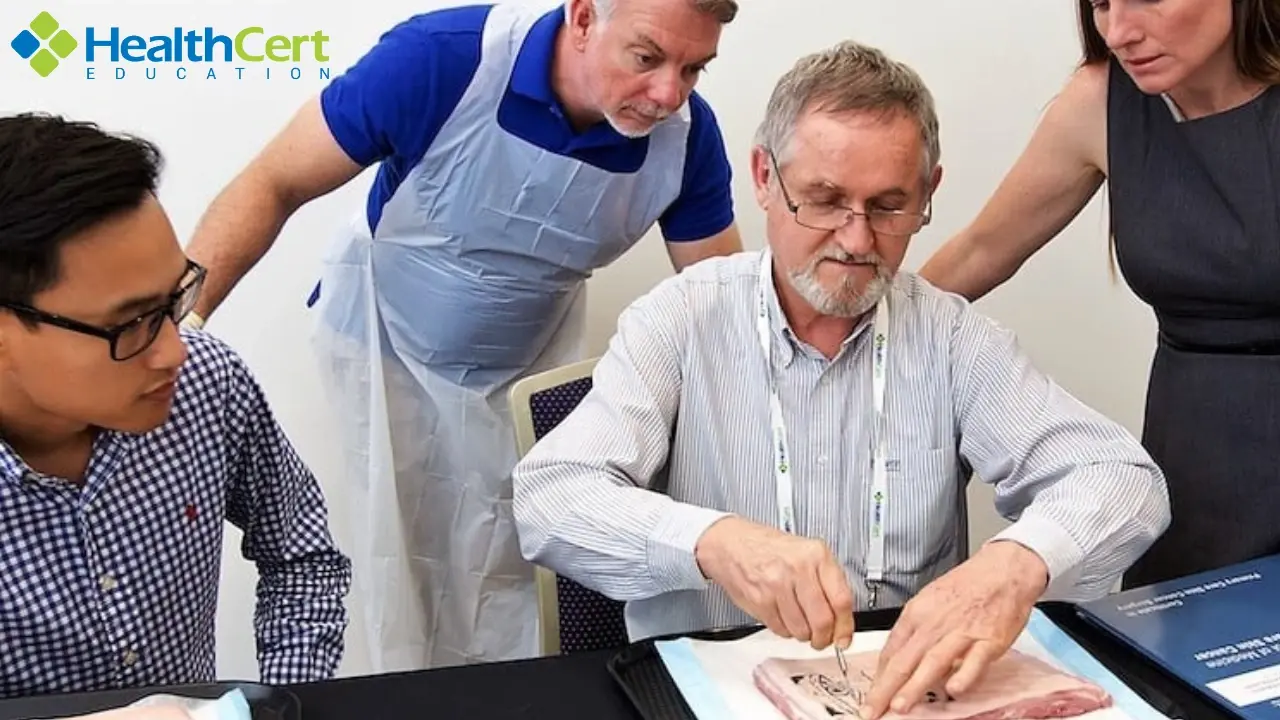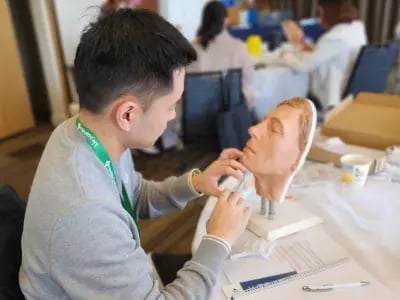Explore all HealthCert Courses
University-assured, CPD-accredited education for doctors and nurses — from full Certificate Courses to flexible Micro-Courses.

![]() Skin Cancer Medicine
Skin Cancer Medicine
from $1,695
Professional Certificate of
SKIN CANCER MEDICINE
Teaches core skills in lesion diagnosis, biopsy, basic excisions, and topical treatments.
Advanced Certificate of
SKIN CANCER MEDICINE
Covers curettage, diathermy, large excisions, and skin grafts.
Professional Diploma of
SKIN CANCER MEDICINE
Focuses on advanced histopathology, rare cancers, complex cases, and cryosurgery.
![]() Skin Cancer Surgery
Skin Cancer Surgery
from $2,595
Professional Certificate of
SKIN CANCER SURGERY
Details skin cancer surgery basics: anatomy, suturing, flaps, grafts, MOHS, and Medicare billing.
Advanced Certificate of
SKIN CANCER SURGERY
Addresses ellipses, flaps, grafts, wedges, suturing, and more advanced skin cancer surgery techniques.
Professional Diploma of
SKIN CANCER SURGERY
Explores neurovascular island, bilobed, banner, rhomboid, and V-Y flaps, and more.
![]() Dermoscopy
Dermoscopy
from $2,095
Professional Certificate of
DERMOSCOPY
Delves into diagnostic algorithms and dermoscopy of facial/acral lesions, naevi, melanoma, and more.
Advanced Certificate of
DERMOSCOPY
Examines pink, mucosal, nail, rare, and difficult benign lesions, plus BCC and difficult melanomas.
Professional Diploma of
DERMOSCOPY
Details how to screen different types of lesions in different skin types and age groups.
Medical Certificate of
DERMOSCOPY FOR DERMATOLOGY
Focuses on dermatoscopy in inflammatory skin diseases, trichoscopy, and skin of colour.
Advanced Certificate of
DERMOSCOPY FOR DERMATOLOGY
Covers the use of dermoscopy in diagnosing a range of common skin and hair conditions.
Advanced Certificate of
HISTOPATHOLOGY FOR DERMOSCOPY
Comprehensive guide to dermatopathology, and how to interpret pathology reports.
Masterclass in
DERMOSCOPY
Finetune your lesion diagnostic skills with this ultimate update in dermoscopy from global experts Profs Giuseppe Argenziano and Aimilios Lallas.
 Skin Cancer Micro-Courses
Skin Cancer Micro-Courses
Prefer to upskill one skill at a time? Explore focused CPD modules on dermoscopy, BCC diagnosis, lesion recognition, and surgical techniques for everyday skin cancer care. → Browse Micro-Courses
Professional Certificate of
GENERAL DERMATOLOGY
Deals with benign lesions, pigment conditions, skin and fungal infections, rashes, psoriasis, dermatitis, acne, blisters, nail diseases, hair loss, paediatric dermatology, and more.
Advanced Certificate of
GENERAL DERMATOLOGY
Addresses vitiligo, dermatomyositis, sarcoidosis, lichen planus, patch testing, cutaneous lymphoma, hidradenitis suppurativa, bullous pemphigoid, alopecia, and more.
Professional Diploma of
GENERAL DERMATOLOGY
Explores bites, ulcers, pressure sores, pregnancy and nutritional dermatoses, oral mucosal and vulvar skin diseases, urticaria, drug eruptions, delusions of parasitosis, STIs, HIV, and more.
 General Dermatology Micro-Courses
General Dermatology Micro-Courses
Explore concise CPD modules in acne, eczema, rosacea, psoriasis, and other common skin conditions — ideal for GPs managing dermatological presentations in primary care. → Browse Micro-Courses
![]() MEDICAL TRICHOLOGY
MEDICAL TRICHOLOGY
from $1,595
Deepen your clinical confidence and gain new practical skills in the diagnosis and management of hair and scalp disorders — from alopecia and inflammatory scalp diseases to hair transplants and hair disorders in men, women, children, and transgender patients.
Professional Certificate of
MEDICAL TRICHOLOGY
Deals with foundations of hair and scalp function, hair examination, trichoscopy, and trichology, and covers male pattern hair loss, female pattern hair loss, telogen effluvium, and alopecia areata.
Advanced Certificate of
MEDICAL TRICHOLOGY
Focuses on advanced pattern hair loss, tinea, and lymphocytic, neutrophilic and mixed cicatricial alopecias, and covers hair biopsy, histopathology, trichology, trichoscopy, and hair transplants.
Professional Diploma of
MEDICAL TRICHOLOGY
Explores transgender and paediatric hair, systemic disease, frontier treatments in hair loss, conditions of "too much hair", non-scalp hair loss, and advanced histopathology, biopsy, and trichology.
 Medical Trichology Micro-Courses
Medical Trichology Micro-Courses
Explore concise CPD modules in alopecia, inflammatory scalp diseases, hair transplants, male and female pattern hair loss, telogen effluvium, tinea, and more — to support confident diagnosis and treatment of hair disorders across primary care and specialist settings. → Browse Micro-Courses
Learn advanced facial aesthetics techniques, patient consultation skills, and safe, evidence-based approaches to facial rejuvenation — with CPD-accredited training developed specifically for medical professionals.
Professional Certificate of
AESTHETIC MEDICINE
Covers safe planning and delivery of the most common and in-demand facial rejuvenation procedures.
Advanced Certificate of
AESTHETIC MEDICINE
Explores advanced rejuvenation techniques like laser, peels, sclerotherapy, neuromodulators, and cosmeceuticals.
Professional Diploma of
AESTHETIC MEDICINE
Examines ultrasound / RF / laser, acne, rosacea, threadlifts, non-surgical body contouring, and more.
 Aesthetic Medicine Micro-Courses
Aesthetic Medicine Micro-Courses
Explore concise modules in facial rejuvenation procedures, patient consultation, and clinical skills relevant to aesthetic medicine in general practice. → Browse Micro-Courses
Learn to diagnose joint and musculoskeletal pains and sports injuries – including weekend sportspeople and professional athletes – and identify their underlying causes, minimise risk for patients, and provide ongoing GP management of these conditions
Professional Certificate of
MUSCULOSKELETAL & SPORTS MEDICINE
Addresses musculoskeletal and back pain, sports injuries, rheumatoid arthritis, and joint and gait problems.
Advanced Certificate of
MUSCULOSKELETAL & SPORTS MEDICINE
Covers osteoporosis, gout, shoulder and groin injuries, limb injuries, and performance in Masters athletes.
Professional Diploma of
MUSCULOSKELETAL & SPORTS MEDICINE
Explores inflammatory arthritis, sports nutrition, exercise in children, role of Team Doctor, and drug use in sport.
 Musculoskeletal & Sports Medicine Micro-Courses
Musculoskeletal & Sports Medicine Micro-Courses
Explore concise CPD modules in joint pain, soft tissue injuries, and exercise-related conditions — ideal for GPs managing dermatological presentations in primary care. → Browse Micro-Courses
![]() Essential skills & conditions
Essential skills & conditions
from $1,095
Professional Certificate of
CLINICAL PROCEDURES
Details in-office procedures to manage lacerations, ulcers, lipomas, abscesses, cysts, foreign bodies, ingrown toenails, warts, haemorrhoids, and more.
Foundation Certificate of
CARDIOVASCULAR MEDICINE
Focuses on atrial fibrillation, congestive cardiac failure, coronary artery disease, and cardiovascular health and weight control in men.
Foundation Certificate of
RESPIRATORY CONDITIONS & INFECTIONS
Covers asthma, COPD, sinusitis, and upper respiratory tact infections.
![]() Chronic Disease & Conditions
Chronic Disease & Conditions
from $495
Professional Certificate of
CHRONIC DISEASE & CONDITIONS
Deals with congestive cardiac failure, COPD, diabetes, GI complaints, chronic kidney disease, osteoarthritis, and more.
Advanced Certificate of
CHRONIC DISEASE & CONDITIONS
Addresses hepatitis, hypertension, coronary artery disease, tobacco-related conditions, obesity, PCOS, prostate conditions / cancer, CV health, and more.
Professional Diploma of
CHRONIC DISEASE & CONDITIONS
Explores thyroid conditions, long-term childhood issues, papulosquamous disorders, osteoporosis, inflammatory arthritis, asthma, and atrial fibrillation.
Foundation Certificate of
ARTHRITIS: TYPES & TREATMENTS
Covers management of osteoarthritis, inflammatory arthritis, rheumatoid arthritis, and gout.
![]() Geriatric Medicine
Geriatric Medicine
from $495
Professional Certificate of
GERIATRIC MEDICINE
Delves into dementia, falls, polypharmacy, nutrition, depression, osteoporosis, and aged / palliative care.
Advanced Certificate of
GERIATRIC MEDICINE
Examines strokes, Parkinson's, driving, cancers, chronic pain, visual impairments, and more.
Professional Diploma of
GERIATRIC MEDICINE
Details COPD, varicose veins, ulcers, various vascular issues, prostate conditions, and post-menopause.
Primary Certificate of
GERIATRIC CANCERS & PALLATIVE CARE
Learn to identify common geriatric cancers and support elderly patients through end-of-life care with confidence and compassion.
![]() Mental Health
Mental Health
from $795
Professional Certificate of
MENTAL HEALTH
Focuses on depression, anxiety, bipolar, eating disorders, PTSD, domestic abuse, and depression in the elderly, and how to assess mental health issues.
Advanced Certificate of
MENTAL HEALTH
Covers dementia, schizophrenia, delusions, autism, ADHD, S4 medications, emergency mental health, and patient communication.
Skills Training: Core Module
MENTAL HEALTH
Deep dives into how to assess patients with mental health issues: Screening, conducting interviews, developing Mental Health Plans, and more.
Clinical Enhancement Module
PTSD
Deep dives into PTSD: Developing GP mental health treatment plans for PTSD, providing ongoing mental healthcare, safeguarding patient safety, and more.
 Chronic & Complex Care Micro-Courses
Chronic & Complex Care Micro-Courses
Explore targeted CPD modules in chronic illness, geriatric care, mental health, clinical procedures, cardiovascular medicine, respiratory conditions, and more — designed to support complex patient needs in general practice. → Browse Micro-Courses
![]() Women's Health
Women's Health
from $495
Professional Certificate of
WOMEN'S HEALTH
Covers STIs, cervical screening, PCOS, pregnancy, breastfeeding, menopause, menstruation, family planning, and domestic abuse.
Advanced Certificate of
WOMEN'S HEALTH
Deals with endometriosis, ovarian cancer, sexual health, reproductive and pregnancy complications, breast health, obesity, and post-menopause.
Professional Diploma of
WOMEN'S HEALTH
Addresses vaginal prolapse, incontinence, breast and ovarian cancers, anorexia nervosa and bulimia, Premature Ovarian Insufficiency, and more.
Primary Certificate of
MENOPAUSE & WOMEN'S HEALTH
Teaches how to manage menopause, post-menopause health issues, and Premature Ovarian Insufficiency.
Primary Certificate of
FAMILY PLANNING FOR WOMEN
Acquire the knowledge to deliver safe, effective, and patient-centred reproductive care for female patients, navigating the full spectrum of options.
Foundation Certificate of
PREGNANCY: MANAGING COMPLICATIONS
Recognise and manage pregnancy complications such as miscarriage, gestational diabetes, hypertension, infections, and pre-term labour.
Advanced Workshop of
INTRAUTERINE SYSTEMS
One-day workshop providing an introduction to the insertion of intrauterine devices (IUDs) as a reversible reproductive control option for women.
![]() Men's Health
Men's Health
from $495
Professional Certificate of
MEN'S HEALTH
Explores prostate conditions / cancer, STIs, sexual dysfunction, depression, fitness, and lifestyle choices.
Advanced Certificate of
MEN'S HEALTH
Covers penile conditions, reproduction, hair loss, CV health, testicular cancer, and androgen deficiency.
Professional Diploma of
MEN'S HEALTH
Examines congestive cardiac failure / artery diseases, HIV, sleep apnoea, gout, musculoskeletal injuries.
Advanced Workshop of
NON-SCALPEL VASECTOMY
One-day hands-on workshop providing no-scalpel vasectomy training for GPs. Gain an introduction to this popular option for permanent control of male reproduction.
Primary Certificate of
SEXUAL HEALTH FOR MEN
Teaches how to manage male sexual dysfunction, penile conditions, and androgen deficiency, and how to perform a reproductive health check.
![]() Sexual & Reproductive Health
Sexual & Reproductive Health
from $1,595
Professional Certificate of
SEXUAL & REPRODUCTIVE HEALTH
Details menstrual irregularities, endometriosis, STIs, PCOS, family planning, vaginal prolapse, breast / ovarian cancers, incontinence, cervical screening.
Advanced Certificate of
SEXUAL & REPRODUCTIVE HEALTH
Focuses on women's sexual health, premature ovarian insufficiency, reproduction problems, pregnancy / complications, menopause.
Professional Diploma of
SEXUAL & REPRODUCTIVE HEALTH
Focuses on men's sexual health, prostate conditions & penile conditions, reproduction, testicular cancer, STIs, androgen deficiency, and sexual dysfunction.
![]() Child Health
Child Health
from $1,595
Professional Certificate of
CHILD & ADOLESCENT HEALTH
Explores asthma / respiratory conditions, immunisation / childhood vaccination, autism and ADHD, animal bites, and long-term childhood conditions.
Advanced Certificate of
CHILD & ADOLESCENT HEALTH
Covers poisoning, anaphylaxis, allergies, allergic conjunctivitis, child neglect, physical / sexual abuse, infections, paediatric dermatology, and blistering / follicular disorders.
![]() Domestic Violence
Domestic Violence
from $1,095
Foundation Certificate of
DOMESTIC ABUSE & VIOLENCE
Explores child neglect, sexual and physical abuse of children, domestic abuse, and elder abuse.
 Reproductive & Sexual Health Micro-Courses
Reproductive & Sexual Health Micro-Courses
Upskill in areas like contraception, menopause, adolescent health, STIs, and family violence with concise CPD modules to support everyday consultations in reproductive and sexual health. → Browse Micro-Courses
![]() Plant-Based Therapies
Plant-Based Therapies
from $1,595
Professional Certificate
Covers uses for chronic pain, anxiety, insomnia, depression, cancer symptoms. Includes guidance on receptor systems, formulations and side effects.
Advanced Certificate
Covers uses for auto-immune issues, hypertension, diabetes, COPD, asthma, skin, IBD, Crohn's, glaucoma, women's health, and more.
Professional Diploma
Covers uses for geriatric medicine, epilepsy, PTSD, mental health, cancer, and complex chronic disease, , with practical dosing frameworks.
![]() Clinical Nutrition
Clinical Nutrition
from $495
Primary Certificate of
CLINICAL NUTRITION &
CHRONIC DISEASE
Focuses on diet approaches to manage chronic disease, and nutrition for diabetes and CV health.
Professional Certificate of
CLINICAL NUTRITION
Covers how to use dietary guidelines to advise treatment, diet myths and fads, sports / childhood nutrition, nutrition for pregnancy / lactation, food allergies, gut microbiome, and elderly malnutrition.
Advanced Certificate of
CLINICAL NUTRITION
Deals with nutrition for chronic disease, diabetes, CV health and kidney disease. Plus, GI health, patient-centred weight management, diet and depression, eating disorders, and motivational behaviour change.
![]() Allergy Medicine from $495
Allergy Medicine from $495
![]() Immunisation from $495
Immunisation from $495
Primary Certificate of
ALLERGY MEDICINE
Looks at anaphylaxis, food allergies, allergic rhinitis / conjunctivitis, desensitisation.
Primary Certificate of
IMMUNISATION & VACCINATION
Covers childhood vaccination, adult vaccination, and travel vaccination schedules.
 Special Interest Micro-Courses
Special Interest Micro-Courses
Access concise learning modules in plant-based therapies, immunisation, allergy care, and clinical nutrition — ideal for expanding your knowledge in high-demand or emerging areas of general practice. → Browse Micro-Courses

Practical workshops
Begin your learning journey online, then join a practical workshop for hands-on training— available as an optional component of select Certificate Courses only.
- Practical procedural training for GPs in a small-group setting.
- Immersive, face-to-face learning with case discussions, live demos, and hands-on practice on pork parts, simulated models, and real people.
- Hone your skills under expert guidance, ask questions, and connect with peers.
- Earn up to 8 hard-to-get Performance Review CPD hours in one day.
Available throughout the year in Brisbane, Melbourne, or Sydney!
Want ongoing access to all topics?
HealthCert 365 is more than just a way to meet CPD requirements — it’s your all-in-one clinical learning platform.
Get unlimited access to 4,000+ hours of accredited content across 100+ topics, including many of the courses listed above.
✔️ Build your own CPD pathway or follow curated 50-hour programs
✔️ Revisit course content anytime, on any device
✔️ Track your CPD progress automatically
✔️ Includes selected content from certificate courses and Micro-Courses

Free courses and resources
Looking to get a feel for HealthCert’s learning experience?
Get started with our selection of free short courses and downloadable resources.

NON-CLINICAL CPD
Our valued partners at AHPD offer crucial CPD on non-clinical topics, helping you reduce the risks you face as a health practitioner and future-proof your career.
Professional Boundaries in Health
Learn to identify the warning signs that boundaries with a patient may be weakening, develop strategies to maintain those boundaries, and protect your career from an inadvertent boundary violation.
AHPRA Advertising Guidelines
Learn the main ways your advertising can unwittingly be in breach of AHPRA's guidelines, the potential outcomes if you slip up, and ultimately how to safely promote your services.
Social Media in Health
Gain a solid understanding of your obligations in respect to social media use as a healthcare professional, get tips to avoid the regulator's gaze, and learn what to do if something goes wrong.
Our Education Advisors can assist you with any queries and tailor our education pathway to suit your current expertise, interests and career goals.

 1800 867 1390
1800 867 1390.png?width=174&height=50&name=2025%20Courses%20overview%20CTA%20(1).png)




